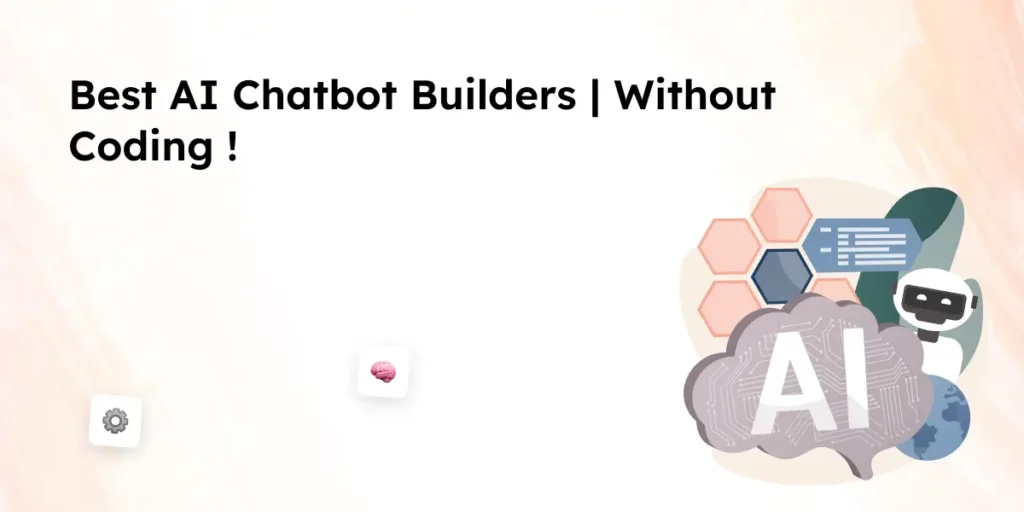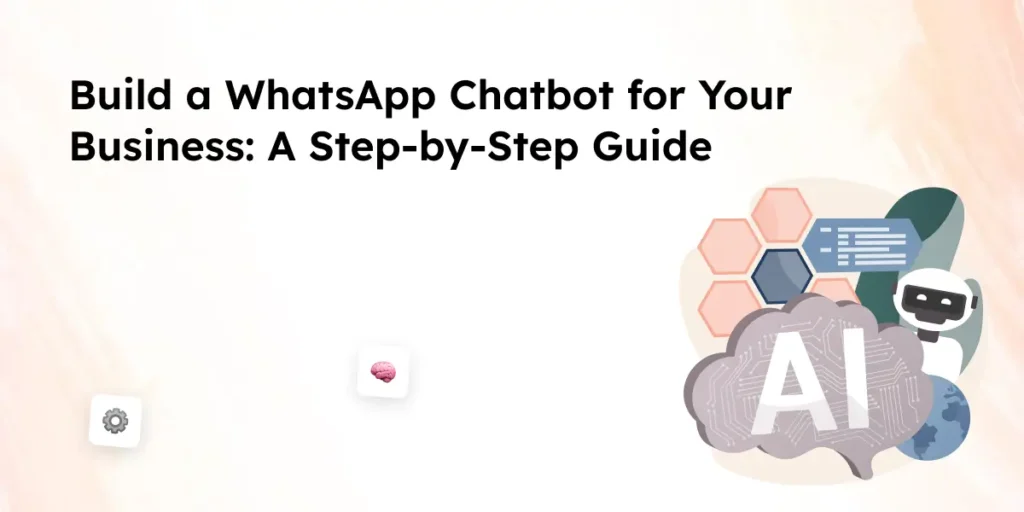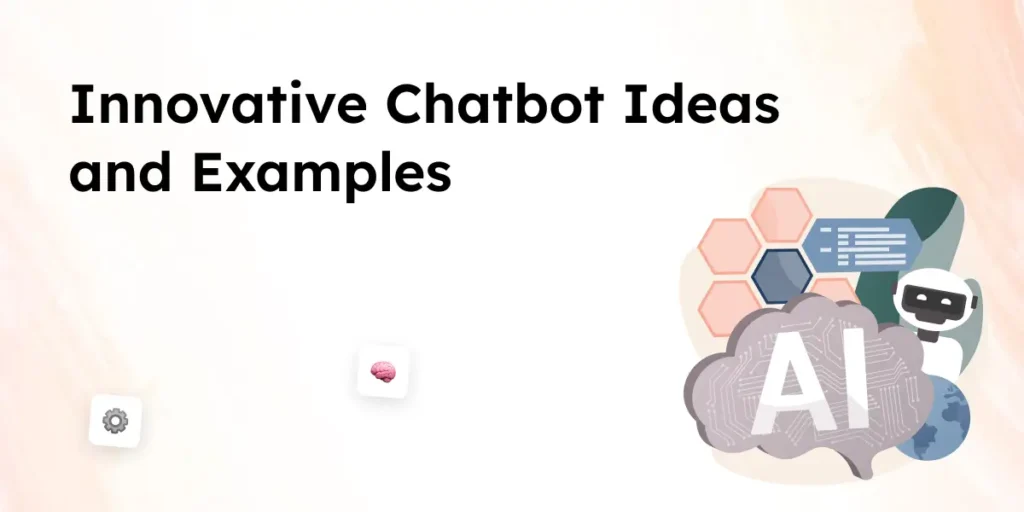Every business wants faster operations, better customer engagement, and smarter automation. Chatbots for enterprise deliver exactly that. These AI-powered chatbots streamline business processes, enhance customer service, and optimize enterprise resource planning.
But how do enterprise chatbots work? Unlike basic automation, these conversational AI bots use natural language processing to engage customers and employees in real-time. Whether it’s answering FAQs, handling IT support, or boosting sales, enterprise chatbots help businesses operate more efficiently.
Why Are Chatbots Becoming Essential for Enterprises?
- Efficiency: Chatbots can handle multiple queries at once, reducing wait times.
- Scalability: Businesses can deploy chatbots across multiple departments and platforms.
- 24/7 Support: AI-driven enterprise chatbots provide round-the-clock assistance.
- Seamless Integration: Integration with other enterprise tools improves workflow.
Companies using enterprise AI chatbot solutions are seeing massive improvements in customer satisfaction and internal operations. This guide will explore the benefits of enterprise chatbots, real-world use cases for enterprise chatbots, the core technologies behind AI-powered enterprise solutions, and the future of enterprise chatbots.
Why Enterprises Need AI Chatbots
Businesses today handle a high volume of customer queries, internal requests, and operational challenges. Managing these processes manually is inefficient and costly. This is where AI chatbots come in. By automating repetitive tasks, improving response times, and integrating with business systems, chatbots help businesses scale their operations efficiently.
The Growing Need for Enterprise Chatbots
Enterprises across industries are turning to AI-powered enterprise chatbots to address key pain points:
- Customer Support Overload – Traditional support teams struggle with high query volumes. Customer service chatbots provide instant responses, reducing ticket backlog.
- Slow Internal Operations – Enterprise IT support teams deal with routine issues. Enterprise bots automate troubleshooting and IT requests.
- Lead Generation & Sales – Businesses need efficient ways to convert prospects. Chatbots for lead generation qualify and nurture leads 24/7.
- HR & Employee Support – HR departments manage payroll, onboarding, and FAQs. Using enterprise chatbot solutions simplifies these processes.
How Enterprise Chatbots Differ from Regular Chatbots
Many companies use basic chatbots for answering FAQs. However, enterprise chatbots differ by offering:
- Advanced AI capabilities – Conversational AI bots can process complex queries.
- Integration with enterprise tools – Connect with enterprise resource planning (ERP), CRMs, and HR systems.
- Personalized automation – Chatbots can handle customer data to deliver tailored responses.
- Security & Compliance – AI chatbot solutions follow enterprise security standards.
Enterprises looking to use chatbots for business efficiency need AI-driven solutions designed for large-scale operations.
Benefits of Using Enterprise Chatbots
Adopting AI-powered enterprise chatbots isn’t just about automation—it’s about enhancing business processes, improving customer experience, and optimizing internal operations. Enterprises that use AI chatbots see improvements in efficiency, cost savings, and engagement. Let’s explore the key benefits of enterprise chatbots and how they revolutionize modern businesses.
1. Automating Repetitive Tasks and Reducing Costs
Chatbots help businesses cut operational costs by handling routine queries and automating workflows. Enterprise chatbots can handle tasks like:
- Answering FAQs in customer service chatbots
- Processing IT and HR requests in enterprise IT support
- Automating lead qualification for sales teams
With chatbots for enterprise, businesses can reduce the workload on human employees and reallocate resources to more critical tasks.
2. Enhancing Customer Support with 24/7 Availability
Unlike human agents, AI-driven enterprise chatbots provide round-the-clock support, ensuring customers get instant responses. Enterprise chatbots provide:
- Multilingual support for global businesses
- Instant responses to common queries
- Chatbots to answer and resolve issues without human intervention
3. Boosting Sales and Lead Generation
Enterprise chatbots help convert more leads by engaging customers in real time. Chatbots can be used to:
- Guide users through the sales funnel
- Recommend products based on customer preferences
- Capture and qualify leads before passing them to sales teams
Many companies use chatbots for lead generation to improve conversion rates and increase revenue.
4. Improving Employee Productivity and Internal Operations
Enterprise chatbots can improve internal efficiency by:
- Assisting employees with HR queries (payroll, leave requests, benefits)
- Automating IT support tasks like password resets and troubleshooting
- Enhancing business systems by integrating with ERP and CRM platforms
By reducing the time spent on manual tasks, enterprise chatbots allow employees to focus on high-value work.
5. Leveraging AI for Data Collection and Insights
Chatbots can collect valuable data from customer interactions. This data helps businesses:
- Identify customer pain points
- Optimize product offerings
- Enhance marketing strategies based on chatbot interactions
Best Use Cases for Enterprise Chatbots Across Industries
AI-powered enterprise chatbots are transforming various industries by automating workflows, improving customer interactions, and optimizing business processes. From enterprise IT support to customer service, these chatbots for enterprise provide real-world value. Below are some of the best use cases for AI chatbots across different sectors.
1. E-Commerce & Retail: Enhancing Customer Experience
Online shoppers expect quick, personalized assistance. Customer service chatbots help retailers by:
✅ Recommending products based on user preferences
✅ Handling order tracking, returns, and refunds
✅ Assisting with FAQs and troubleshooting issues
With AI-driven enterprise chatbots, retailers provide seamless customer service while reducing support costs.
2. Banking & Finance: Secure and Efficient Support
Financial institutions must deliver accurate and secure assistance. Enterprise chatbots help by:
✅ Answering customer queries about transactions, loans, and account details
✅ Detecting fraudulent activity and notifying users
✅ Assisting with investment recommendations and financial planning
Many banks use AI chatbots to handle routine inquiries, allowing human agents to focus on complex financial needs.
3. Healthcare: AI Chatbots for Patient Support
In the healthcare sector, chatbots can help patients by:
✅ Scheduling appointments and sending reminders
✅ Assisting with symptom checking and preliminary diagnosis
✅ Providing medication reminders and general health information
AI-powered chatbots can also improve hospital administration by managing patient records and queries efficiently.
4. IT & SaaS: Automating Enterprise IT Support
Tech companies and IT departments rely on enterprise chatbots to manage internal operations. Chatbots to provide IT assistance include:
✅ Troubleshooting software and hardware issues
✅ Resetting passwords and managing user access requests
✅ Assisting with onboarding new employees with IT setup
By using enterprise chatbot solutions, IT teams reduce service desk workload and speed up resolutions.
5. HR & Internal Operations: Employee Assistance
HR teams use AI chatbot solutions to enhance workforce productivity. Enterprise chatbots can be used to:
✅ Answer HR-related questions on policies, benefits, and payroll
✅ Assist in onboarding new employees with automated workflows
✅ Collect employee feedback and track engagement
Enterprise chatbots can improve internal communication, making HR teams more efficient.
6. Travel & Hospitality: Personalized Customer Service
Travel companies use chatbots to provide instant travel assistance. Chatbots can handle:
✅ Flight and hotel booking queries
✅ Real-time updates on flight delays and itinerary changes
✅ Personalized travel recommendations
AI-powered chatbots for enterprise improve the booking experience and enhance customer satisfaction.
7. Manufacturing & Supply Chain: Streamlining Logistics
Manufacturing companies leverage enterprise chatbots for:
✅ Tracking shipments and delivery status
✅ Managing warehouse inventory requests
✅ Assisting with procurement and supply chain inquiries
AI-powered enterprise solutions ensure real-time data tracking, reducing delays and improving logistics efficiency.
Why These Use Cases Matter for Enterprises
The enterprise chatbot use cases mentioned above highlight the versatility of AI-driven automation. Whether it’s improving customer support, boosting sales, or enhancing internal workflows, enterprise chatbots provide real-world solutions tailored to business needs.
In the next section, we’ll explore how enterprise chatbots work, covering the core technologies behind AI-powered enterprise chatbots and their integration with business systems.
Implementing the Right Enterprise Chatbot: A Step-by-Step Guide
Now that we understand how enterprise chatbots work, let’s dive into how businesses can successfully deploy an AI-powered enterprise chatbot. Whether you’re looking to enhance customer service, automate internal processes, or streamline operations, following the right steps ensures a smooth and effective implementation.
Step 1: Define Your Business Needs and Objectives
Before implementing a chatbot for enterprise, businesses must clearly define their goals. Ask:
✅ What problems should the AI chatbot solve?
✅ Will the chatbot be used for customer service chatbots, internal support, or sales?
✅ How will success be measured (cost savings, response time, customer satisfaction)?
Understanding your business needs helps in choosing the right features and functionalities.
Step 2: Choose the Right Enterprise Chatbot Solution
Selecting the right enterprise chatbot depends on your company’s requirements. There are two main options:
1️⃣ Custom AI Chatbots – Built from scratch with advanced AI models and full customization.
2️⃣ Pre-Built Conversational AI Platforms – Ready-made solutions with integrations for enterprise tools.
Factors to consider:
✅ Conversational AI platform with natural language processing capabilities
✅ Scalability for future business growth
✅ Integration with other enterprise tools (ERP, CRM, HR systems)
Step 3: Train and Optimize Your AI Chatbot
For the chatbot to be effective, it must use AI to continuously improve its responses. Training involves:
✅ Feeding the chatbot industry-specific data
✅ Implementing chatbots to understand user queries accurately
✅ Using AI-driven analytics to refine chatbot interactions
The more data an enterprise AI chatbot processes, the better it gets at handling complex inquiries.
Step 4: Deploy Chatbots and Integrate with Business Systems
Once trained, the chatbot needs to be integrated with other enterprise tools for seamless operations. This includes:
✅ Enterprise resource planning (ERP) for supply chain management
✅ Customer support ticketing systems for automated issue resolution
✅ Enterprise IT support for automating internal troubleshooting
A well-integrated chatbot enhances business processes without disrupting existing workflows.
Step 5: Monitor Performance and Continuously Improve
After deployment, tracking the chatbot’s performance is essential. Businesses should:
✅ Analyze chatbot interactions to improve accuracy
✅ Measure success metrics like response time and user engagement
✅ Regularly update chatbot knowledge for evolving business needs
By constantly optimizing the AI chatbot solution, enterprises ensure long-term success.
Why Following These Steps Ensures Success
Deploying an enterprise chatbot isn’t just about automation—it’s about improving operational efficiency, enhancing customer experience, and driving business growth. Companies that follow these steps can successfully use enterprise chatbots to maximize their impact.
In the next section, we’ll explore the features of enterprise chatbots and what to look for when choosing a chatbot solution.
Features of Enterprise Chatbots: What to Look for in the Right Solution
Choosing the right enterprise chatbot requires understanding the key features of enterprise chatbots that drive efficiency, improve customer experience, and enhance business processes. The best AI-powered enterprise chatbots go beyond simple automation—they integrate with enterprise tools, adapt to business needs, and offer a seamless conversational experience.
1. Advanced Conversational AI & Natural Language Processing (NLP)
A conversational AI platform should be able to understand and respond to user queries naturally. Key capabilities include:
- Natural language processing (NLP) for accurate intent recognition
- Conversational AI bots that provide human-like interactions
- Sentiment analysis to adjust responses based on customer tone
These capabilities of enterprise chatbots ensure smooth, engaging interactions.
2. Seamless Integration with Enterprise Tools & Business Systems
The best enterprise chatbot solutions integrate with:
- Enterprise resource planning (ERP) systems
- CRM platforms like Salesforce and HubSpot
- Helpdesk software for automated ticketing
- HR and payroll systems for employee support
By integrating with other enterprise tools, chatbots streamline operations and improve efficiency.
3. Scalability and Multi-Channel Support
A chatbot for enterprise should work across multiple platforms, including:
- Websites and mobile apps
- Messaging apps like WhatsApp and Slack
- Email and voice assistants
Chatbots can be used to engage users on their preferred platforms, ensuring a consistent experience.
4. AI-Driven Learning & Personalization
AI chatbot solutions should learn and adapt over time. Features include:
- Continuous learning from past interactions
- AI-driven recommendations for personalized responses
- Context-aware conversations for deeper engagement
AI-powered enterprise chatbots improve with each interaction, enhancing customer satisfaction.
5. Security, Compliance, and Data Protection
Since enterprises handle sensitive data, security is a top priority. Enterprise chatbots provide:
- End-to-end encryption for secure messaging
- Compliance with GDPR, HIPAA, and SOC 2 regulations
- Role-based access controls to protect enterprise data
Choosing a chatbot that meets compliance standards ensures data security across business systems.
6. Customization & Workflow Automation
Each business has unique needs. Enterprise chatbots offer:
- Customizable workflows to automate business operations
- Industry-specific solutions (e.g., finance, healthcare, IT support)
- AI-driven automation for repetitive tasks
This flexibility allows enterprises to tailor chatbot functions to fit their specific business needs.
The Future of Enterprise Chatbots: Trends to Watch
The role of enterprise chatbots is rapidly evolving, driven by advancements in AI, conversational AI, and machine learning. Businesses are adopting smarter, more intuitive AI-powered enterprise solutions that go beyond basic automation. Let’s explore the key trends shaping the future of enterprise chatbots and how they will redefine business processes.
1. AI-Driven Hyper-Personalization
Future AI chatbot solutions will deliver hyper-personalized experiences by:
- Learning from past interactions to provide context-aware responses
- Analyzing user behavior to tailor product recommendations
- Adapting tone and style based on customer sentiment
This level of personalization ensures chatbots can provide a human-like experience, increasing engagement and customer satisfaction.
2. Conversational AI and Voice-Enabled Chatbots
The rise of conversational AI means that chatbots are becoming more interactive. Chatbots can also support:
- Voice-enabled AI chatbots for hands-free assistance
- Integration with smart devices and virtual assistants
- Real-time speech recognition for customer interactions
With improvements in conversational AI platforms, businesses can enable chatbots to handle both text and voice-based interactions seamlessly.
3. AI Chatbots for Employee Experience and Enterprise IT Support
Enterprise IT support chatbots are becoming essential for workplace automation. Enterprise chatbots can improve internal operations by:
- Handling IT troubleshooting and password resets
- Automating HR queries related to payroll and benefits
- Assisting employees with onboarding and training
Companies using enterprise chatbot solutions for internal workflows are seeing reduced IT workload and faster issue resolution.
4. Chatbots Integrated with Enterprise Resource Planning (ERP) Systems
Enterprises will increasingly use AI chatbots to enhance ERP functionality by:
- Automating supply chain and inventory management
- Providing real-time data access and reporting
- Assisting in financial operations and forecasting
Integration with other enterprise tools like ERP and CRM will ensure seamless workflow automation.
5. Predictive Analytics and Data-Driven Insights
Future enterprise chatbots will not only answer queries but also predict user needs. Key innovations include:
- AI-powered analytics for sales forecasting
- Customer behavior predictions based on chatbot interactions
- Automated decision-making using big data
Chatbots can collect valuable insights that help businesses optimize their operations and improve user engagement.
6. Security-First Enterprise Chatbots
As AI chatbots handle more sensitive data, security will remain a top priority. Future enterprise chatbot solutions will focus on:
- Advanced encryption and multi-factor authentication
- AI-driven fraud detection for financial transactions
- Compliance with strict industry regulations (GDPR, HIPAA)
Businesses must invest in AI-powered enterprise chatbots that prioritize data security while offering seamless automation.
Conclusion
AI-powered enterprise chatbots are transforming the way businesses operate, offering automation, efficiency, and seamless customer interactions. Whether used for customer service chatbots, enterprise IT support, or sales, these AI-driven solutions help businesses scale while reducing costs. With advancements in conversational AI, chatbots are now capable of handling complex queries, integrating with business systems, and learning from interactions to provide better experiences.
As enterprises continue to adopt AI, the future of enterprise chatbots will bring even more sophisticated capabilities, including hyper-personalization, voice-enabled AI, and predictive analytics. Now is the time for companies to deploy chatbots and harness the power of AI to streamline operations and enhance customer engagement. The key to success lies in choosing the right enterprise chatbot, integrating it with existing systems, and continuously refining its capabilities to meet evolving business needs.
FAQs About Enterprise Chatbots
1. How long does it take to deploy an enterprise chatbot?
The deployment time varies based on complexity. A basic chatbot can be set up in a few weeks, while a fully integrated AI-powered enterprise chatbot may take several months, depending on customization and data training requirements.
2. What are the key benefits of enterprise chatbots?
The benefits of enterprise chatbots include cost reduction, improved response times, enhanced customer support, and automated workflows. Enterprise chatbots help businesses scale without adding extra workforce costs.
3. What are the best use cases for enterprise chatbots?
Some of the best use cases include customer support, sales automation, HR and IT support, banking and finance, healthcare, and supply chain management. Enterprise chatbots provide intelligent automation across multiple industries.
4. How do enterprise chatbots differ from regular chatbots?
Enterprise chatbots differ from standard chatbots by offering advanced natural language processing, deeper integrations with enterprise resource planning (ERP) and CRM systems, and the ability to handle complex workflows and security requirements.


